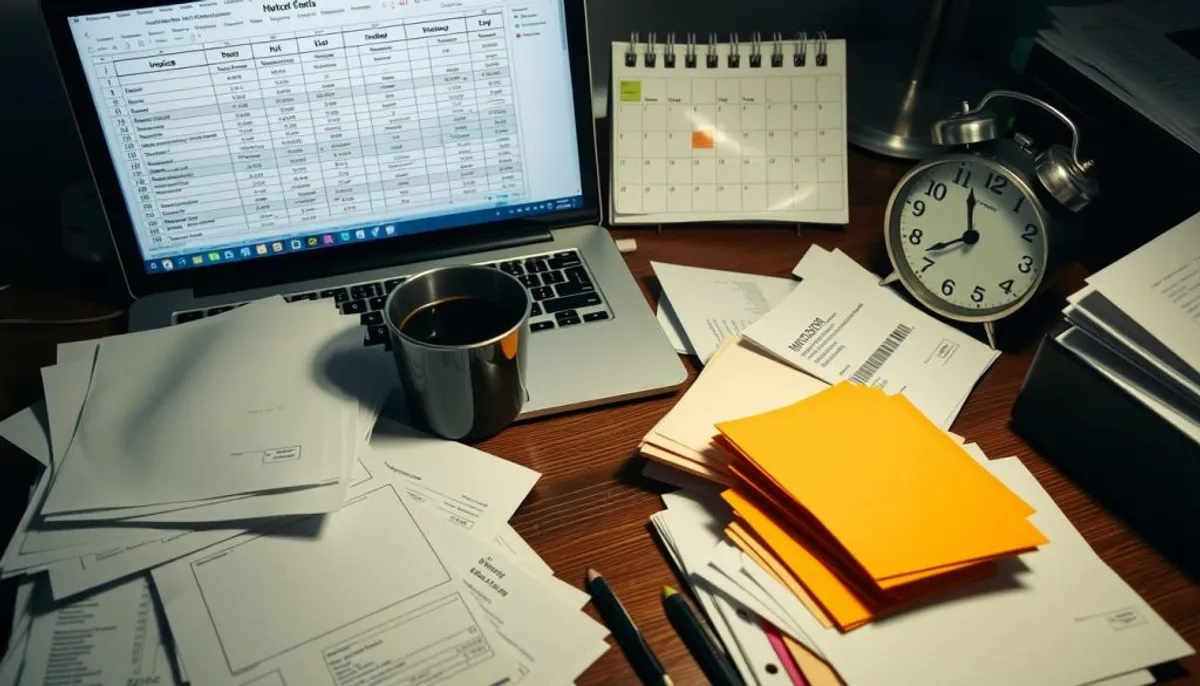Small business owners often face the tough challenge of overdue payments. These can really hurt their cash flow and slow down their success. This guide offers practical tips and solutions to help manage overdue payments well. It aims for financial stability and quick debt recovery.
When payments are late, it can start a chain reaction. This leads to extra fees, harm to credit scores, and the risk of not meeting financial duties. By taking early steps, small business owners can avoid these problems. This article covers various strategies, like sending reminders, using invoice factoring services, and hiring debt collection agencies. It gives readers the tools they need to handle overdue payments.

Key Takeaways
- Understand the importance of addressing overdue payments for small businesses
- Learn effective strategies for sending timely payment reminders
- Discover ways to update and resend invoices to eliminate excuses
- Develop communication techniques to better understand client reasons for non-payment
- Explore options for escalating the situation, including formal demand letters and legal implications
Introduction
Overdue payments can really hurt a small business’s cash flow and financial health. When bills aren’t paid on time, it can cause delays in paying vendors and make it hard to meet financial duties. It might even lead to legal trouble. It’s key to handle overdue payments well to keep a business running smoothly.
The importance of addressing overdue payments is huge. Overdue payments can mess up a small business’s cash flow. This makes it tough to pay suppliers, employees, and other bills. This can lead to big problems, like disputes with clients, strained relationships, and even going out of business.
By tackling overdue payments early, small business owners can avoid these risks. This keeps the business financially stable. It also helps the company grow and succeed in a tough market.
We’ll look at ways to manage overdue payments well in the next sections. This will help small businesses stay financially strong.
Overdue Payment
An overdue payment is when an invoice isn’t paid on time. This can cause big problems for small businesses. These issues include cash flow problems, damaged relationships, and bad credit scores.
Definition and Consequences of Overdue Payments
When a client doesn’t pay by the due date, the payment is seen as overdue. This can really hurt small businesses in many ways, such as:
- Cash Flow Disruptions: Overdue payments mess up the cash flow. This makes it hard for businesses to pay their bills, like employee salaries, vendors, and suppliers.
- Strained Business Relationships: If payments are often late, it can hurt the trust with clients. This might risk future work and chances for growth.
- Negative Credit Impacts: Regular overdue payments can hurt a business’s credit score. This makes it harder to get loans, credit lines, or good deals from suppliers.
These consequences of overdue payments can really affect a small business’s operations and finances. That’s why it’s key to have good strategies to handle and prevent late payments.
Send Gentle Reminders
When dealing with overdue payments, start with a gentle reminder. This method aims to solve the problem without conflict. It’s important to keep a professional and polite tone to keep a good relationship with the customer. Highlight the need for timely payments too.
Sending overdue payment reminders helps communicate with clients and get them to pay on time. Gentle reminders can be a polite email or a friendly call. They remind the customer about the invoice and when it’s due. Using effective communication helps solve the issue without hurting the client relationship.
- Craft a professional and courteous email or phone call
- Politely remind the customer of the outstanding invoice and due date
- Emphasize the importance of timely payments without being confrontational
- Maintain a positive relationship with the client throughout the process
The secret to successful overdue payment reminders is finding a balance. Be firm but keep the client relationship positive. A gentle, persistent approach often solves the problem early, saving the business relationship.
Update and Resend Invoices
Updating invoices can help stop excuses for late payments. Customers might say they lost the original invoice or need to check their records for the right payment amount. To fix this, send an updated invoice right away, even if the customer has the first one.
Eliminating Excuses by Providing Updated Invoices
Sending an updated invoice shows you care about clear and correct info for payments. This step helps avoid excuses for not paying on time. It makes sure customers see the latest and most important payment info.
When you update and resend invoices, make sure to include these important parts:
- A clear and prominent due date
- Detailed breakdown of goods or services provided
- Accurate total amount owed, including any applicable taxes or fees
- Multiple payment options and instructions
- Concise language emphasizing the importance of timely payment
By giving updated invoices, businesses make paying easier and less likely to be late. This method not only stops excuses but also shows you’re serious about clear and efficient billing.
Communicate with Clients
When a client won’t pay, talking things out is key. Ask them about their happiness with the work, their money issues, or what else might be causing trouble. This shows that non-payment is rarely a plan to hurt your business. Clients often want to solve problems if you let them.
Strategies for Understanding Clients’ Reasons for Non-Payment
To fix payment issues and keep good client talks, try these tips:
- Listen well to what the client says and don’t argue. Be kind and ready to solve problems together.
- Use open questions to get the client’s view on the work and their money troubles.
- Look into payment plans or other ways to pay that could help the client.
- Be open to reviewing the work or changing the agreement if the client is really unhappy.
- Give help or advice to the client on how to get their billing and payments better.
By working together and showing you care about solving the problem, you can usually find a way that helps everyone. This keeps the client happy and pays on time.
Firm Demands for Payment
When a client doesn’t answer emails or calls, you might need to be more direct. Experts say service businesses can issue an ultimatum to clients they work with regularly. This means setting a deadline for when service will stop if the bill isn’t paid. This can push the client to pay because they don’t want to lose your service.
Issuing an ultimatum is a big step, but it might be needed to get the client’s attention. By clearly showing what will happen if they don’t pay, you stress how important it is for them to pay. This is especially true for small businesses that need steady cash to keep going.
When you give the ultimatum, stay professional and skip the emotional talk. Stick to the facts and how it affects your business. Say something like, “If we don’t get the full payment by the end of the week, we’ll stop your service.” This makes things clear and prepares you for what to do next if they don’t pay.
- Set a clear deadline for payment in the ultimatum
- Communicate the consequences of non-payment, such as service interruption
- Maintain a professional tone and avoid emotional language
- Be prepared to follow through on your ultimatum if the payment is not received
Asking for a firm payment can be tough but sometimes it’s needed to get paid for your work. By being clear about what happens if they don’t pay and sticking to it, you protect your business’s money matters. You also show you’re serious about doing business right.
Escalate the Situation
If the first steps didn’t work, businesses might need to take more action. They should ask for a clear payment plan and keep following up. If not, they can send the original contract again, warning that legal action will be taken if the invoices are not paid.
Formal Demand Letters and Legal Implications
Experts suggest writing a formal demand-payment letter. This letter should list the debt and what happens if it’s not paid by the due date. It’s a final warning, showing the seriousness of the escalating non-payment issue and the risk of legal action if not paid.
The letter should have these important parts:
- A detailed breakdown of the debt, including any extra fees or interest
- A specific payment deadline, usually 7-10 business days
- A clear statement that not paying will lead to the business taking legal action to get the debt
- Contact details for the business and how to make the payment
Sending a formal demand letter shows the business is serious about taking legal steps if needed. This can motivate the customer to pay what they owe.
Invoice Factoring Services
When a business struggles with cash flow and isn’t sure when customers will pay, invoice factoring can help. This service lets businesses sell their accounts receivable to a factoring company. They get a percentage of the invoice value, usually between 70% and 90%, right away.
The factoring company then collects the payment from the customer. They give the business the rest of the money, minus a fee. This can ease cash flow problems while waiting for customers to pay.
Benefits of Invoice Factoring
- Immediate access to working capital for operations and growth
- Better cash flow management and meeting financial duties
- No more chasing late payments from customers
- Potential to grow by taking on more clients or projects
Factors to Consider
- Factoring fees and service charges
- Creditworthiness of the factoring company
- Impact on customer relationships
- Long-term viability of the invoice factoring arrangement
Using invoice factoring services can unlock the value of accounts receivable. It helps improve a business’s financial health. This lets them focus on core operations and strategic growth.

| Feature | Description |
|---|---|
| Advance Rate | Typically 70% to 90% of the invoice value |
| Factoring Fees | Vary based on the factoring company, industry, and invoice amount |
| Payment Terms | Factoring companies usually collect payments directly from customers within 15-30 days |
| Eligibility | Businesses with healthy accounts receivable and creditworthy customers |
Overdue Payment Collection Agencies
When you’ve tried everything to get paid, you might need to hire a debt collection agency. These experts are great at getting back payments that are over 90 days late. They use different ways to get the customer to pay up. But, think of this as a last resort because it can hurt your relationship with the customer.
Small businesses might pick a professional debt collection service for several reasons:
- They know how to handle debt collection and follow the law.
- They can push delinquent customers to pay through formal talks and negotiation.
- They might get back more of the debt than you could on your own.
- It frees up the business owner to focus on what’s important.
But, remember, using a debt collection agency can strain your customer relationships. So, try everything else first. With a good and professional debt collection agency, small businesses can get back what they owe and keep good customer ties.
Establish Clear Payment Terms
Protecting your business from late payments starts with clear expectations. Talk about payment terms and deadlines before starting any project or contract. This makes sure everyone knows what’s expected and strengthens the client’s commitment.
When setting payment terms, think about these important points:
- Clearly outline the total cost of the project or service, including any additional fees or expenses.
- Agree on payment deadlines, such as net 30 or net 60 days, and specify the consequences for late payments.
- Determine the acceptable payment methods, whether it’s check, electronic transfer, or online payment platforms.
- Outline the contract terms, including any cancellation policies or provisions for scope changes.
By setting clear payment terms upfront, you build trust and accountability with your clients. This approach prevents issues with late payments and sets the stage for a successful business relationship.
| Key Elements of Clear Payment Terms | Benefits |
|---|---|
|
|
Billing Upfront
For some businesses, the risk of not getting paid is too high with just an invoice. That’s why they bill their clients upfront and ask for advance payments before starting work.
Businesses with a good reputation and strong customer ties can ask for advance payments and get it. This way, they make sure they get paid for their work. Even if there are problems with the final product or if the client can’t pay later.
Mitigating Risks with Upfront Billing
Asking for upfront billing and advance payments helps businesses avoid the risks of not getting paid. By getting the full payment upfront, they know they’ll be paid for their work. This removes the worry of not getting paid for their time and effort.
- Upfront billing ensures the business is paid for their work, even if issues arise later on.
- Advance payments help eliminate the risk of non-payment, providing financial security for the business.
- Businesses with a strong reputation can often earn the trust of clients to request upfront billing.
This method might not work for every client, but upfront billing and advance payments can be a good plan for businesses. They help reduce the risks of not getting paid on time or at all.
Overdue Payment Reminders
Sending timely overdue payment reminders is key to getting clients to pay on time. Experts suggest following up the next day after an invoice is due, especially for late payers. Then, send more follow-up strategies at 30, 60, and 90 days late, making the messages stronger as the invoice gets more overdue.
It’s also smart to think about when to send these reminders. Tuesdays, before or after lunch, are good times since they’re less busy for clients. This persistent communication helps get payments back on schedule.
Effective Strategies for Overdue Payment Reminders
- Follow up the day after the invoice is due
- Send additional reminders at 30, 60, and 90 days overdue
- Adjust the tone and language to match the level of overdue status
- Choose optimal times and days to send reminders, such as before or after lunch on Tuesdays

Using these overdue payment reminder strategies can boost timely payments. It also reduces the stress of overdue payments on cash flow and financial health.
Conclusion
Handling overdue payments is key to running a successful small business. By using the tips in this article, businesses can better manage their cash flow. This helps keep good client relationships and ensures their financial health.
Steps like sending reminders, updating invoices, and clear communication are crucial. Also, making firm payment demands, escalating issues, and using debt collection services are important. Each step helps in solving overdue payment solutions. By managing your cash flow well, your business can thrive and beat the problems of late payments.
Dealing with overdue payments is complex and needs a good plan. By following the advice in this article, small business owners can improve their finances. They can also strengthen their ties with clients and focus on growing their business.
RelatedRelated articles



